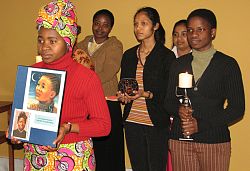Nuns to shine spotlight on sex trafficking during Super Bowl

By Amy H. Smessaert Indianapolis — A group of 11 orders of Catholic women religious in Indiana and Michigan who invest in hotel chains to affect social change is collaborating with state and local officials to curb human trafficking during festivities leading up to the Feb. 5 Super Bowl in Indianapolis. Incidents of human trafficking – or modern-day slavery – tend to spike alongside major sporting events like the Olympics, the World Cup and the Super Bowl to meet the high demand for commercial sex. The U.S. State Department estimates that between 14,500 and 18,000 persons – many of them women and children – are trafficked into the country each year. The National Human Trafficking Resource Center reported that over 11,800 calls were made to its hotline regarding sex trafficking in 2010, including calls from the state of Indiana. "No one wants human trafficking in their town," said Immaculate Heart of Mary Sister Ann Oestreich, who is coordinating the Super Bowl 2012 Anti-Trafficking Initiative for the Coalition for Corporate Responsibility for Indiana and Michigan (CCRIM). "These activities happen in the dark. What we are attempting to do is to shine a light on sex trafficking and reduce opportunities for it to happen." CCRIM, whose members include the Sisters of the Holy Cross in Notre Dame, Ind., has been working with a task force comprising the Indiana Attorney General’s Office, Indianapolis Metropolitan Police Department and other nonprofit organizations to raise awareness about human trafficking and to take steps to prevent it. Since early January, CCRIM has been contacting the managers of 220 hotels within a 50-mile radius of Indianapolis to ask four questions: 1. Have employees received training to recognize potential occurrences of human trafficking in their hotels? 2. Is there a protocol in place for hotel employees to document and report possible incidences of trafficking? 3. Are hotel employees/managers aware of the local groups working to end trafficking? 4. Is the hotel willing to make anti-trafficking information available to guests? Follow-up plans will be developed based on the response to the four questions. The goal of this initiative is to raise awareness, assure that hotel staff receive appropriate training, and distribute educational materials to hotels willing to make them available in lobbies and guest rooms prior to the Super Bowl. Ultimately, CCRIM seeks to have area hotels sign on to the Code of Conduct developed by Ending Child Prostitution and Trafficking (ECPAT-USA) to deter child sexual exploitation. "Human trafficking is a tragic violation of human rights that devastates its victims, strips away their dignity and security, and tears at the fabric of our global society," said Holy Cross Sister Joan Marie Steadman, president of the Congregation of the Sisters of the Holy Cross. "It is a form of imprisonment and oppression which demands both a compassionate response to the cries of victims and action for justice for those who long for a future with hope. Compassion and justice are at the heart of the CCRIM Super Bowl 2012 Anti-Trafficking Initiative." "Human trafficking" is an umbrella term for activities in which one person obtains or holds another in compelled service through threat or use of force, coercion, abduction, fraud, deception, abuse of power or vulnerability. Forms of human trafficking include the prostitution of others, sexual exploitation, forced labor, slavery or similar practices, and the removal of organs. Often described as a modern form of slavery, human trafficking occurs across borders or domestically. The United Nations estimates that 700,000 to 4 million women and children are trafficked around the world for purposes of forced prostitution, labor and other forms of exploitation every year. Trafficking is estimated to be a $15.5 billion annual business in the United States alone, according to the United Nations Global Initiative to Fight Human Trafficking. Amy H. Smessaert is communications director for the Congregation of the Sisters of the Holy Cross in Notre Dame, Ind.
© Copyright 2024 The Diocese of Salt Lake City. All rights reserved.

Stay Connected With Us